The grant program, divided into three separate phases, was developed to support and strengthen behavioral health integration efforts underway at clinics and consortia. The goal was to identify, elevate and accelerate promising practices in integrated behavioral health care throughout the state of California.
Phase I
Early adopters of integrated behavioral care were selected for Phase I. These “vanguard primary care clinics and consortia” were thought to be more advanced than many others across the state and therefore in a better position to serve as mentors and role models.
The following seven California-based primary care clinics and two primary care clinic associations were awarded grants by IBHP:
Primary Care Clinics
Family Health Centers of San Diego
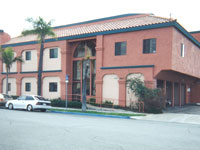 Family Health Centers of San Diego (FHCSD) has its origins in community activism activities in the Barrio Logan area of San Diego in the early 1970’s. From these modest origins, FHCSD has rapidly expanded into a federally funded network comprising numerous primary care clinics located throughout the County of San Diego, three mobile medical units delivering school-based health services and health care to the homeless, runaway and at-risk youth, and many other sites providing ancillary services. The FHCSD system of medical clinics offers adult medicine, pediatrics, women’s health- including perinatal care and delivery, family planning, preventive screening and gynecological care; dentistry; optometry; child and family intervention services- including speech and language screening and therapy, physical therapy for ages 0-3 and audiology; mental health services; health education and prevention- including diabetes education and support, and cardiovascular risk reduction; laboratory, pharmacy, and other selected specialty care services.
Family Health Centers of San Diego (FHCSD) has its origins in community activism activities in the Barrio Logan area of San Diego in the early 1970’s. From these modest origins, FHCSD has rapidly expanded into a federally funded network comprising numerous primary care clinics located throughout the County of San Diego, three mobile medical units delivering school-based health services and health care to the homeless, runaway and at-risk youth, and many other sites providing ancillary services. The FHCSD system of medical clinics offers adult medicine, pediatrics, women’s health- including perinatal care and delivery, family planning, preventive screening and gynecological care; dentistry; optometry; child and family intervention services- including speech and language screening and therapy, physical therapy for ages 0-3 and audiology; mental health services; health education and prevention- including diabetes education and support, and cardiovascular risk reduction; laboratory, pharmacy, and other selected specialty care services.
FHCSD’s mental health services are provided in varied settings: two free-standing mental health clinics, some of the primary care clinics in the FHCSD network, and numerous schools in Central San Diego and the eastern portion of San Diego County. Those served, depending on the site, include chronically mentally ill adults, couples who want counseling, victims of domestic violence, severely emotionally disturbed children, and perpetrators of domestic violence attending a court-sanctioned fifty-two week program. Our bilingual and primarily bicultural staff provide assessment, individual and family counseling, crisis intervention, psychiatric evaluation, medication support, and case management services.
In two of the FHCSD primary care sites where mental health staff are stationed, mental health services for those people suffering from depression are closely integrated with the work of the primary care providers. The providers prescribe most of the medications and work closely with the therapist/case manager. Both disciplines use the PHQ-9 form as a measure of monitoring progress in treatment, and consult with each other frequently during the course of treatment. When cases are complex, either can consult with the on-site psychiatrist and/or refer the patient for assessment and additional medication support. These sites, North Park Family Health Center and City Heights Family Health Center, are participating in the Integrated Behavioral Health Project, helping to identify best practices for providing mental health care in the context of the primary care setting.
Family Healthcare Network, Visalia
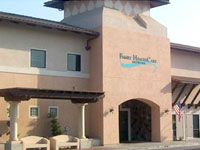 The Family HealthCare Network is a private, non-profit community-based organization established in 1976. Family HealthCare Network currently has 13 locations throughout Tulare County of which 11 are clinical sites. Family HealthCare Network is a community-based organization governed by a Board of Directors, which is composed of community representatives and patients consumers. Our purpose is defined by our mission statement: “We provide quality healthcare to everyone in the communities we serve.”
The Family HealthCare Network is a private, non-profit community-based organization established in 1976. Family HealthCare Network currently has 13 locations throughout Tulare County of which 11 are clinical sites. Family HealthCare Network is a community-based organization governed by a Board of Directors, which is composed of community representatives and patients consumers. Our purpose is defined by our mission statement: “We provide quality healthcare to everyone in the communities we serve.”
We are licensed by the State of California as a community clinic. In 1989, the Federal and State governments designated us as a Federally Qualified Health Center (FQHC). In 1997, we became the first freestanding ambulatory care center in Tulare County to be accredited by the Joint Commission on Accreditation of HealthCare Organizations.
We continue to provide a full array of services that is required of a Federally Qualified Health Center. We provide Family Medicine, Internal Medicine, Pediatrics, Obstetrics and Gynecology, Family Planning, Dentistry, Clinical Laboratory, Radiology, Mammography, Ultrasound, Integrated Complementary Alternative Medicine, Pharmacy, Health Education and Promotion, Translation, Integrated Behavioral Health, Nutritional Counseling, Community Outreach and Transportation services.
We currently have over sixty five thousand patients enrolled with us throughout our service area. We will provide more than two hundred thirty-six thousand outpatient visits this year, and over fifteen thousand inpatient hospital visits. Family HealthCare Network is one of the largest employers in Tulare County as well as the largest Primary Care Provider.
Services are provided by a team of highly qualified professionals working together in multi-disciplinary teams, including board certified physicians, certified nurse midwives, certified physician assistants, nurse practitioners, licensed clinical social workers and health educators, support staff and administrative staff. The organization utilizes various quality assurance processes and tools and was recognized particularly by the Joint Commission on Accreditation of HealthCare Organizations for our performance improvement programs.
The Integrated Behavioral Health program has been developed as part of an ongoing effort to provide a more holistic form of treatment for patients, focusing on the relationship between the body, mind and behavior.
Studies show that over two thirds of all patients who come to a medical clinic are struggling with life stress issues such as financial or relationship problems, adjustment to chronic health conditions, and other issues which greatly affect a patients’ general health.
The Integrated Behavioral Health program brings mental health services right into the primary care exam room unlike the traditional psychotherapy model.
The goal of the integrated behavioral health program is to provide a better overall quality of care, which ultimately decreases medical costs and improves consumer and provider satisfaction. Increased access to the behavioral health consultants, and the use of behavioral health interventions (which are both time-limited and strategically focused), allows Family HealthCare Network to provide holistic care to a larger population.
Golden Valley Health Center, Merced
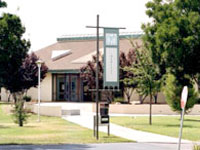 Golden Valley Health Centers is a JCAHO-accredited, private, non-profit Federally Qualified Health Center system that has served California’s Central Valley for more than 35 years. Through our community health centers, we provide comprehensive primary medical, dental and behavioral health as well as health promotion and eligibility screening to an ethnically diverse population, including migrant and seasonal farm workers, Southeast Asian refugees and the homeless population of Modesto. Golden Valley Health Centers also has extensive outreach program. Golden Valley has developed a system of 24 clinical sites and seven dental sites, including two freestanding women’s health centers, three school-based centers, a homeless healthcare program, as well as three mobile medical clinics. All of our revenue comes from patient dollars and charitable sources, as well as Federal and State grants. No patient is turned away because of inability to pay.
Golden Valley Health Centers is a JCAHO-accredited, private, non-profit Federally Qualified Health Center system that has served California’s Central Valley for more than 35 years. Through our community health centers, we provide comprehensive primary medical, dental and behavioral health as well as health promotion and eligibility screening to an ethnically diverse population, including migrant and seasonal farm workers, Southeast Asian refugees and the homeless population of Modesto. Golden Valley Health Centers also has extensive outreach program. Golden Valley has developed a system of 24 clinical sites and seven dental sites, including two freestanding women’s health centers, three school-based centers, a homeless healthcare program, as well as three mobile medical clinics. All of our revenue comes from patient dollars and charitable sources, as well as Federal and State grants. No patient is turned away because of inability to pay.
Golden Valley Health Centers began integrating behavioral health into its primary care services five years ago as a response to overwhelming nationwide research that many people would rather go unserved that to obtain services from a mental health clinic, and that most people would prefer to receive counseling or mental health medications at the same place they receive their physical care. GVHC currently has four behavioral health clinicians and a psychiatrist serving seven of GVHC’s clinic sites. In the integrated program, behavioral health clinicians work with primary care providers as a team to treat the whole person, addressing physical and mental health needs.
Mendocino Community Health Clinic, Inc., Ukiah
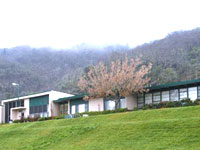 Mendocino Community Health Clinic established its first health center in 1992. Since then, we have opened two other centers and, in 2005, a satellite site at a homeless shelter. Over the years, we have developed a business model that includes recruiting and retaining clinicians committed to a community-based care model, and who share our vision of guaranteeing access to care. MCHC ensures that there are no closed doors for those seeking primary health care at MCHC in Lake and Mendocino Counties
Mendocino Community Health Clinic established its first health center in 1992. Since then, we have opened two other centers and, in 2005, a satellite site at a homeless shelter. Over the years, we have developed a business model that includes recruiting and retaining clinicians committed to a community-based care model, and who share our vision of guaranteeing access to care. MCHC ensures that there are no closed doors for those seeking primary health care at MCHC in Lake and Mendocino Counties
MCHC approaches patient healthcare from an integrated holistic approach. By integrating mental health services onto the floor of a primary care setting, primary care providers are able to work together with our behavioral consultants more effectively to help patients maintain or improve their health/mental health status.
Our behavioral health consultants, which we refer to as Primary Care Counselors, provide psychosocial assessment as needed and co-manage certain problems with primary care providers. The Primary Care Counselor provides education, and behavioral management skills for health conditions, lifestyle issues, depression and other mental health disorders.
Our integrated services include: Brief Primary Care-based Counseling; Short-Term Psychotherapy; Suboxone Clinic for Opioid Dependence; Chronic Pain Management; Smoking Cessation; Women’s Health; ADHD Assessment; Child/Adolescent Behavioral Health; Care Coordination with County Mental Health Departments; and Psychiatric Medication Management
Open Door Community Health Centers, Arcata
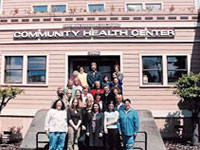 The Open Door Community Health Centers started as a store-front free clinic in 1971. Today we operate eight clinics and a mobile dental van in Humboldt and Del Norte Counties offering a full range of medical, dental, and mental health services. This includes pediatrics, prenatal and birth services, family planning, geriatrics, urgent care, HIV/AIDS care, alternative medicine, and nutritional counseling.
The Open Door Community Health Centers started as a store-front free clinic in 1971. Today we operate eight clinics and a mobile dental van in Humboldt and Del Norte Counties offering a full range of medical, dental, and mental health services. This includes pediatrics, prenatal and birth services, family planning, geriatrics, urgent care, HIV/AIDS care, alternative medicine, and nutritional counseling.
We exist to provide health care and education to residents of Humboldt and Del Norte Counties and surrounding rural areas. Through example, education, and participation in the health care community, Open Door clinics seek to promote the development of a healthcare system which meets the needs and enhances the health of all of the individuals in our communities.
Open Door clinics provide services to all, regardless of their ability to pay, including individuals on Medi-Cal, Medicare, the uninsured, the homeless, individuals with AIDS, and Hispanic farm workers. Beyond serving as the safety net provider for the most vulnerable individuals in our community, we serve 1 in 4 residents of Humboldt and Del Norte Counties for their primary care, and thus are integral to the medical infrastructure. We provide the majority of obstetrical care at our local hospital. Open Door also has the most comprehensive HIV and buprenorphine/substance abuse programs on the north coast.
In January 2006, the Telehealth and Visiting Specialist Center was established as a means for offering specialty services to remote sites using telecommunication technologies. Services provided include telemedicine consultations, pediatrics, diabetes education, behavioral health, podiatry, HIV /Hepatitis C, cardiology, orthopedics, pulmonology and gynecology. We are also one of two state community health centers embarking on a pilot program with the Cisco Corporation to provide automated, urgent care telehealth services to remote areas.
The Behavioral Health program at Open Door consists of two Behavioral Health Consultants at each of our four major sites. Psychologists, LCSWs and case managers provide services consistent with the philosophy, service goals and health care strategies of the primary care model. The Behavioral Health Director is a family practitioner, ensuring integration and serving as a liaison with the community mental health services.
The Behavioral Health Consultant’s role is to support the ongoing behavioral health interventions of the primary care provider. The focus is on resolving problems within the primary care service context. In this sense, the behavioral health provider is a key member of the primary care team, functioning as a consultant. Behavioral health visits are limited, brief, and provided in the primary care practice area, so that the patient views meeting with the Behavioral Health Consultant as a routine primary care service.
Consistent with the service philosophy of primary care, the goal of primary behavioral medicine is to detect and address the broad spectrum of behavioral health needs in the primary care patient population, with the aims of early identification, quick resolution, long-term prevention and “wellness.” Since the Open Door is located in a rural area with few resources for outside therapy, needed counseling services are provided as well, including EMDR and biofeedback. Teams of primary care providers and behavioral health consultants provide pain group education and supportive care. We have an established relationship with County Mental Health services, and are in the process of collaborating with them to establish a telepsychiatry program with each of our main clinic sites.
Sierra Family Medical Clinic. Nevada City
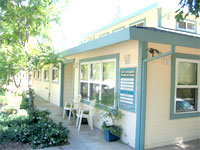 Sierra Family Medical Clinic is a nonprofit community health center, established in 1979 to serve all persons of Nevada County and the surrounding communities, regardless of age, sex, race, color, national origin, religion, disability, or ability to pay. It is located 20 miles north of Nevada City, California, in an isolated rural area bordering three counties. The closest hospital and emergency room facility is approximately 40 minutes by car. Some 5000 residents in the surrounding area depend on the care they receive at SFMC as their medical lifeline. The medical staff is composed of two physicians, a nurse practitioner and a physician assistant.
Sierra Family Medical Clinic is a nonprofit community health center, established in 1979 to serve all persons of Nevada County and the surrounding communities, regardless of age, sex, race, color, national origin, religion, disability, or ability to pay. It is located 20 miles north of Nevada City, California, in an isolated rural area bordering three counties. The closest hospital and emergency room facility is approximately 40 minutes by car. Some 5000 residents in the surrounding area depend on the care they receive at SFMC as their medical lifeline. The medical staff is composed of two physicians, a nurse practitioner and a physician assistant.
SFMC’s Integrated Behavioral Health program was initiated in May of 2002 through a grant from the Northern Sierra Rural Health Network, which funded the hiring of the Behavioral Health Consultant, Jennifer Sale, and the administration of a research study on depression. Since the program’s inception, the clinic has added a consulting psychiatrist, Dr. Eric Rubenstein, who sees patients one full day a week, and a second BHC, Dr. Michael Askins, who also sees patients one day a week. Jennifer now works full-time as a behavioral health consultant and Director of Behavioral Health.
Social Action Community Health System. San Bernardino
Social Action Community Health System (SACHS) is a multidisciplinary medical clinic that provides behavioral health, primary care, dentistry, pediatric medicine, preventive medicine, speech pathology, OB-GYN and maternal-child services. This clinic serves as a training and outreach clinic for Loma Linda University, a medical arts university. Behavioral health services are provided by psychology, social work, marriage and family therapy graduate students. Children ages 0-5 are enrolled in a preventive health program entitled, Good2Grow, funded by First Five.
A Family Health Survey is included in the admission materials of all patients in Primary Care. Each patient whose survey indicates moderate to high risk is seen by a Family Health Consultants (FHCs), typically a doctoral student in Marriage and Family Therapy who has studied medical terminology, neuroaffective science and psychotropic effects, families and illness, and systemic issues in chronic illnesses. Some patients are seen by direct physician request, and treatment plans coordinated between physician and FHC. The vast majority of patients are seen on routine visits by FHCs in the exam rooms before they see the physician, using brief systemic interventions. Referrals for ongoing behavioral health sessions or drug and alcohol counseling are given, or resources for external housing, financial, or other assistance.
Primary Care Clinic Consortia
Council of Community Clinics. San Diego
The Council of Community Clinics (CCC) represents and supports 16 community clinic corporations in San Diego County in their efforts to provide access to quality health care and related services for the diverse communities they serve with an emphasis on low income and uninsured populations. Member clinics provide services at over 60 sites. In 2002, CCC clinic members provided care to over 400,000 patients in 1 million patient visits. Of these, approximately 30,000 visits were for mental health services at 19 locations. Mental health programs differ by clinic organization, and vary from highly developed and integrated systems of care, to on-site mental health assessments and treatment, to complete reliance on private providers, outside of the clinic network. Most clinics have at least one site that offers mental health services, and the other sites have identified agencies to which they refer patients needing services for serious mental illness, severe emotional disturbance, depression, posttraumatic stress disorder, and other mental health issues.
CCC is the sole source contractor for the Mental Health Services Act Community Services and Support program for integrated physical and behavioral health in San Diego County. As part of the contract, the CCC will administer $1.8 million per year for three years (January 2007 through June 2009), with four additional one-year options to implement the Primary Care and Mental Health Integration Project. 10 clinics corporations are participating in the Primary Care and Mental Health Integration Project. There are three main program components to this program. First, clinics will provide services to children with serious emotional disturbance (SED) and adults/older adults with serious mental illness (SMI), and will be reimbursed for therapy visits, medication, and psychiatry visits. Clinics are reimbursed on a claims process from a pool held by the Council of Community Clinics. Second, six clinics will implement the IMPACT program, where a part-time depression care manager provides problem solving therapy to clients with mild to moderate depression, and the primary care physician prescribes medication if needed. Expenses for the depression care manager are billed monthly to the CCC, who reimburses the clinic. The third component is the promotora program, where five clinics will train promotoras or peer educators to reach out to older adults needing mental health services, and link them back to the clinics. Promotoras are being trained on peer outreach techniques and strategies, as well as stigma, depression, and other topics of assistance in reaching out to seniors. Clinics bill the CCC on a monthly basis for the promotora coordinator, promotora incentives, and transportation such as bus passes and taxi vouchers for patients. Clinics began seeing patients and billing for most services around April 2007.
Northern Sierra Rural Health Network. Nevada City
Northern Sierra Rural Health Network (NSRHN) (description page will link to is a non-profit corporation formed in 1996. Our mission is to promote the health and well-being of communities in rural Northern California through comprehensive health care planning, integrated health care delivery systems, education activities and charitable programs and services that expand access to care for all residents regardless of ability to pay.
NSRHN membership comprises over 40 safety-net providers, including clinics and community health centers, rural hospitals, county public health and mental health departments, and others. We cover a nine county region in northeastern California of over 30,000 square miles, 80% of which is rural or frontier. NSRHN programs and services include:
- Telehealth programs, based on an advanced videoconferencing network which supports telemedicine consultations, distance learning activities and meetings.
- Technology programs, currently focusing on developing our network as a Health Information Exchange (HIE) over a secure internet link, developing E-prescribing services, and training clinicians and other health care personnel in the utilization of advanced technology.
- Workforce programs. NSRHN is designated as the North State Area Health Education Center (AHEC) and seeks to strengthen the rural health care workforce by building stronger relationships among educational institutions, health care employers, workforce development partners and local communities.
- Education services. NSRHN is an accredited provider of Continuing Medical Education (CME) and California Board of Behavioral Sciences CE Units. NSRHN is a leader in utilizing video conferencing for distance education and training of its members.
- Policy and advocacy support, representing the needs of the safety-net health care system in rural Northern California at local, state and federal levels to advocate for access to health care services for all residents.
NSRHN supports primary care providers to help them integrate the delivery of mental health services into their primary care practices. We have provided training to family physicians to help them better diagnose and treat patients with lower-level behavioral health problems, paid for mid-level behavioral health workers such as LCSWs, MFTs, and Clinical Psychologists who provide mental health services within primary care settings, and supported the delivery of psychiatric services via telemedicine to patients needing higher levels of care.
Some of our efforts include:
- Opening a legislative window for Medi-Cal telepsychiatry [link to telespsychiatry section of this web site] billing in a primary care setting;
- Regional Mental Health Integration Project funded by The California Endowment;
- Support of telepsychiatric services for indigent people in the NSRHN region;
- Training for primary care providers to improve their clinical skills;
- Technical Assistance to help primary care settings integrate mental health into their practices;
- Advocacy efforts;
- Special projects;
Behavioral Health Projects are have been supported by the HRSA Office of Rural Health Policy and The California Endowment.
Phase II
The 27 California clinics and clinic consortia receiving Phase II grants from IBHP, including both “Learner Site” and “Development Site” funds, are:
- All for Health, Health for All, Glendale
- Asian Health Services, Oakland
- Asian Pacific Health Care Venture, Los Angeles
- Avenal Community Health Center, Avenal
- Central City Community Health Center, Los Angeles
- Chapa-De Indian Health, Grass Valley
- CommuniCare Health Centers, Davis
- Community Health Clinic Olé, Napa
- Council of Community Clinics, San Diego
- Eisner Pediatric & Family Medical Clinic, Los Angeles
- Glide, San Francisco
- Golden Valley Health Centers, Merced
- LifeLong Medical Care, Berkeley
- Long Valley Health Center, Laytonville
- Mendocino Community Health, Ukiah
- North Coast Clinic Networks, Eureka
- Open Door Community Health Centers, Arcata
- Petaluma Health Center, Petaluma
- Ravenswood Family Health Center, East Palo Alto Area
- St. John’s Well Child and Family Center, Los Angeles
- San Francisco Clinic Consortia, San Francisco
- Share Our Selves, Costa Mesa
- Sierra Family Health Center, Nevada City
- South Bay Family Healthcare, Torrance
- URDC/Bill Moore Comm. Health, Pasadena
- Family Health Centers of San Diego, San Diego
- La Clinica De La Raza, Oakland
Phase III
A more select group of clinics/consortia was chosen for Phase III, based on the organization’s ability to implement components basic to a person-centered health care home. The Phase III recipients are:
- Council of Community Clinics, San Diego
- Golden Valley Health Centers, Merced
- Hill Country Community Clinic, Shasta
- Lifelong Medical Care, Berkeley
- Open Door Community Health Centers, Arcata
- St. John’s Well Child and Family Center, Los Angeles County
- Sierra Family Health Center, Nevada City
